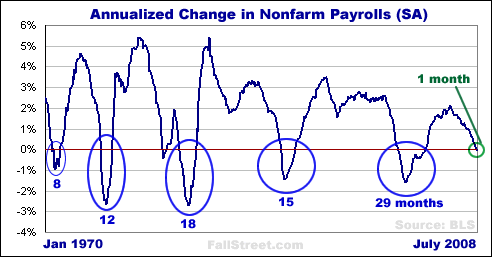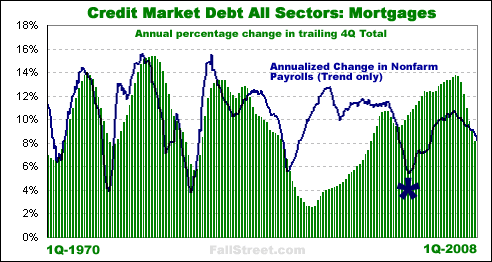US Economy Second Half Stimulus and Bailouts Bounce?
Economics / US Economy Sep 03, 2008 - 04:53 PM GMTBy: Brady_Willett

 With U.S. home prices crashing, inflation expectations rising, and consumer confidence plummeting, you would think that the U.S. economy would be shedding jobs at a pace comparable, at minimum, to previous recessions. This hasn't been the case, at least not yet. Rather, despite posting job losses in each of the last 7-months U.S. nonfarm payrolls have held up surprisingly well this year.
With U.S. home prices crashing, inflation expectations rising, and consumer confidence plummeting, you would think that the U.S. economy would be shedding jobs at a pace comparable, at minimum, to previous recessions. This hasn't been the case, at least not yet. Rather, despite posting job losses in each of the last 7-months U.S. nonfarm payrolls have held up surprisingly well this year.
But while there is grounds for optimism when observing the historical jobs data, the future is hardly rosy. Rather, for the first time since November 2003 payrolls shot lower on year-over-year basis in July, and historically such an occurrence marks the beginning of an ominous trend.
 |
Disregarding the four month contraction in the early 1980s (which could be included the 18-month negative trend that occurred shortly thereafter), the average year-over-year contraction phase in payrolls has lasted 16.4 months since 1970. To reiterate, July 2008 marked month number one of the current downturn.
As you might suspect, jobs growth is a decent indicator of credit growth and, more specifically, mortgage activity * . This relationship is easily observed when comparing the above chart to that of mortgage debt.
 |
Assuming Wall Street is unable to reincarnate the subprime mania and/or the Fed is unable/unwilling to ignore dangerous/fraudulent lending practices*, the basic trend to be taken from the above is that the pace of jobs growth generally peaks prior to mortgage activity, and that jobs growth hits bottom before or as mortgage activity bottoms. Obviously these data points are an important consideration to those that dare attempt to call a bottom in the U.S. housing market. Moreover, given the increasingly important relationship between the housing market and Wall Street balance sheets, the jobs picture may ultimately be the indicator of the size and severity of tomorrow's busts and bailouts (needless to say, bailouts and busts can produce their own trickle down effects).
In short, with calls for a second half rebound about to be tested, the most pressing question at hand is has the U.S. jobs market really reached a bottom? Those that believe it has may be well served to absorb the above, take a deep breath, and ask again: Really?
* What dumfounded many analysts during the last recession was that even as the U.S. economy lost jobs mortgage growth quickened and real estate prices boomed. Given that the Fed may not be able to reduce interest rates as aggressively as they did from 2001-2003 because of inflation and that repeat of the widespread fraud that marred the subprime mania appears highly unlikely, it can be said that the conflicting relationship between jobs growth and mortgage growth during the last recession was an anomaly.
By Brady Willett
FallStreet.com
FallStreet.com was launched in January of 2000 with the mandate of providing an alternative opinion on the U.S. equity markets. In the context of an uncritical herd euphoria that characterizes the mainstream media, Fallstreet strives to provide investors with the information they need to make informed investment decisions. To that end, we provide a clearinghouse for bearish and value-oriented investment information, independent research, and an investment newsletter containing specific company selections.
Brady Willett Archive |
© 2005-2022 http://www.MarketOracle.co.uk - The Market Oracle is a FREE Daily Financial Markets Analysis & Forecasting online publication.


